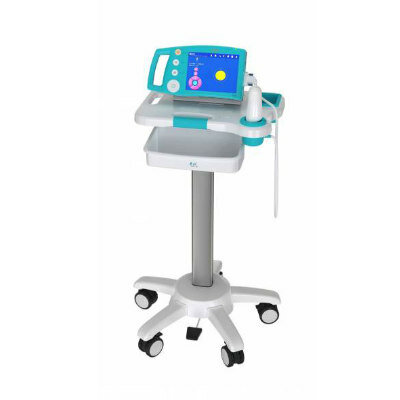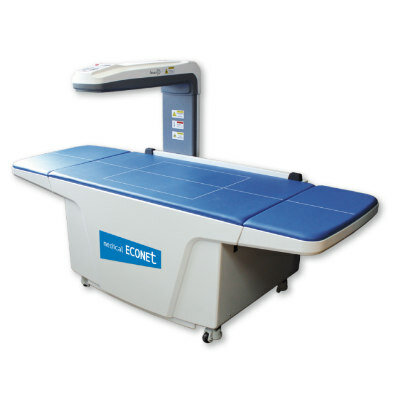ACR Expands Pilot Program Focused on AI and Radiology
|
By MedImaging International staff writers Posted on 06 Jul 2019 |

Image: The AI-LAB as a service provides a vendor-neutral framework to facilitate the development, modeling and validation of AI tools (Photo courtesy of ACR).
Radiology professionals from seven renowned health care institutions will use the ACR AI-LAB to demonstrate the process of creating investigational artificial intelligence (AI) models from image data without the use of a programming language. Using an AI model developed at one institution, each of the seven institutions will have the ability to evaluate and optimize the model for their own investigational use.
The American College of Radiology {(ACR), Reston, VA, USA} is making available the ACR AI-LAB as a service, which provides a vendor-neutral framework to facilitate the development, modeling and validation of AI tools. Based on the recently announced ACR AI-LAB reference architecture, this pilot represents a major milestone in the effort to allow institutions to develop high-quality algorithms that address local clinical needs, some of which may ultimately be made commercially available. In addition to the seven institutions, there are two major technology contributors; NVIDIA is providing software and edge infrastructure, and Nuance is providing last-mile integration to the participating radiologist.
The pilot – originally including Massachusetts General Hospital and The Ohio State University – now also includes Lahey Hospital and Medical Center, Emory University, The University of Washington, the University of California San Francisco and Brigham and Women’s Hospital. NVIDIA will provide its NVIDIA Clara AI software toolkits at no cost to the institutions to perform the annotation creation, transfer learning, and pipeline integration. In addition, Nuance will provide the last-mile technology required to integrate AI for the participating radiologist. Once the pilot is complete, the initiative is anticipated to progressively expand to all institutions interested in participating.
Sharing local AI models from image data between institutions for fine tuning — while patient information remains securely on site at the originating institution — has not previously been done successfully in radiology at this scale. This is due, in part, to the variability in how medical images are created, including the equipment, software, and protocols used. The pilot sites will use ACR AI-LAB to evaluate AI developed elsewhere, modifying the investigational algorithms to improve performance based on testing and evaluating them on local patient data. Creating the local AI models will not require ACR AI-LAB users to have programming skills. ACR AI-LAB allows users to adjust and change AI models without having to make line-by-line changes to the underlying code.
Once the pilot is complete, the consortium is anticipated to progressively expand to more institutions and vendors interested in participating. The investigational algorithms resulting from this project will undergo further evaluation and refinement by sites should they pursue commercialization, including obtaining appropriate regulatory clearance or approvals, as applicable.
“Today marks a major step in accelerating the development of AI for medical imaging. We know algorithms can underperform when deployed at sites where they weren’t trained. Now, radiologists in the pilot program will have access to AI algorithms developed outside their institutions in order evaluate a model’s performance using their own data and, as necessary, retrain the algorithm using their local data to enhance its performance,” said Bibb Allen Jr., MD, FACR, ACR Data Science Institute (ACR DSI) Chief Medical Officer.
“AI technology is entering the next phase where software writes software and less computer science expertise is required,” said Abdul Hamid Halabi, director of healthcare, at NVIDIA. “Radiologists have always been technology trailblazers. Working with the ACR AI-LAB to bring NVIDIA’s AI computing capability to the edge — where radiologists and their data reside — we are demonstrating that investigational AI tools can be made available to any imaging institution.”
Related Links:
American College of Radiology
The American College of Radiology {(ACR), Reston, VA, USA} is making available the ACR AI-LAB as a service, which provides a vendor-neutral framework to facilitate the development, modeling and validation of AI tools. Based on the recently announced ACR AI-LAB reference architecture, this pilot represents a major milestone in the effort to allow institutions to develop high-quality algorithms that address local clinical needs, some of which may ultimately be made commercially available. In addition to the seven institutions, there are two major technology contributors; NVIDIA is providing software and edge infrastructure, and Nuance is providing last-mile integration to the participating radiologist.
The pilot – originally including Massachusetts General Hospital and The Ohio State University – now also includes Lahey Hospital and Medical Center, Emory University, The University of Washington, the University of California San Francisco and Brigham and Women’s Hospital. NVIDIA will provide its NVIDIA Clara AI software toolkits at no cost to the institutions to perform the annotation creation, transfer learning, and pipeline integration. In addition, Nuance will provide the last-mile technology required to integrate AI for the participating radiologist. Once the pilot is complete, the initiative is anticipated to progressively expand to all institutions interested in participating.
Sharing local AI models from image data between institutions for fine tuning — while patient information remains securely on site at the originating institution — has not previously been done successfully in radiology at this scale. This is due, in part, to the variability in how medical images are created, including the equipment, software, and protocols used. The pilot sites will use ACR AI-LAB to evaluate AI developed elsewhere, modifying the investigational algorithms to improve performance based on testing and evaluating them on local patient data. Creating the local AI models will not require ACR AI-LAB users to have programming skills. ACR AI-LAB allows users to adjust and change AI models without having to make line-by-line changes to the underlying code.
Once the pilot is complete, the consortium is anticipated to progressively expand to more institutions and vendors interested in participating. The investigational algorithms resulting from this project will undergo further evaluation and refinement by sites should they pursue commercialization, including obtaining appropriate regulatory clearance or approvals, as applicable.
“Today marks a major step in accelerating the development of AI for medical imaging. We know algorithms can underperform when deployed at sites where they weren’t trained. Now, radiologists in the pilot program will have access to AI algorithms developed outside their institutions in order evaluate a model’s performance using their own data and, as necessary, retrain the algorithm using their local data to enhance its performance,” said Bibb Allen Jr., MD, FACR, ACR Data Science Institute (ACR DSI) Chief Medical Officer.
“AI technology is entering the next phase where software writes software and less computer science expertise is required,” said Abdul Hamid Halabi, director of healthcare, at NVIDIA. “Radiologists have always been technology trailblazers. Working with the ACR AI-LAB to bring NVIDIA’s AI computing capability to the edge — where radiologists and their data reside — we are demonstrating that investigational AI tools can be made available to any imaging institution.”
Related Links:
American College of Radiology
Latest Industry News News
- Bayer and Google Partner on New AI Product for Radiologists
- Samsung and Bracco Enter Into New Diagnostic Ultrasound Technology Agreement
- IBA Acquires Radcal to Expand Medical Imaging Quality Assurance Offering
- International Societies Suggest Key Considerations for AI Radiology Tools
- Samsung's X-Ray Devices to Be Powered by Lunit AI Solutions for Advanced Chest Screening
- Canon Medical and Olympus Collaborate on Endoscopic Ultrasound Systems
- GE HealthCare Acquires AI Imaging Analysis Company MIM Software
- First Ever International Criteria Lays Foundation for Improved Diagnostic Imaging of Brain Tumors
- RSNA Unveils 10 Most Cited Radiology Studies of 2023
- RSNA 2023 Technical Exhibits to Offer Innovations in AI, 3D Printing and More
- AI Medical Imaging Products to Increase Five-Fold by 2035, Finds Study
- RSNA 2023 Technical Exhibits to Highlight Latest Medical Imaging Innovations
- AI-Powered Technologies to Aid Interpretation of X-Ray and MRI Images for Improved Disease Diagnosis
- Hologic and Bayer Partner to Improve Mammography Imaging
- Global Fixed and Mobile C-Arms Market Driven by Increasing Surgical Procedures
- Global Contrast Enhanced Ultrasound Market Driven by Demand for Early Detection of Chronic Diseases
Channels
Radiography
view channel
Novel Breast Imaging System Proves As Effective As Mammography
Breast cancer remains the most frequently diagnosed cancer among women. It is projected that one in eight women will be diagnosed with breast cancer during her lifetime, and one in 42 women who turn 50... Read more
AI Assistance Improves Breast-Cancer Screening by Reducing False Positives
Radiologists typically detect one case of cancer for every 200 mammograms reviewed. However, these evaluations often result in false positives, leading to unnecessary patient recalls for additional testing,... Read moreMRI
view channel
PET/MRI Improves Diagnostic Accuracy for Prostate Cancer Patients
The Prostate Imaging Reporting and Data System (PI-RADS) is a five-point scale to assess potential prostate cancer in MR images. PI-RADS category 3 which offers an unclear suggestion of clinically significant... Read more
Next Generation MR-Guided Focused Ultrasound Ushers In Future of Incisionless Neurosurgery
Essential tremor, often called familial, idiopathic, or benign tremor, leads to uncontrollable shaking that significantly affects a person’s life. When traditional medications do not alleviate symptoms,... Read more
Two-Part MRI Scan Detects Prostate Cancer More Quickly without Compromising Diagnostic Quality
Prostate cancer ranks as the most prevalent cancer among men. Over the last decade, the introduction of MRI scans has significantly transformed the diagnosis process, marking the most substantial advancement... Read moreUltrasound
view channel
Deep Learning Advances Super-Resolution Ultrasound Imaging
Ultrasound localization microscopy (ULM) is an advanced imaging technique that offers high-resolution visualization of microvascular structures. It employs microbubbles, FDA-approved contrast agents, injected... Read more
Novel Ultrasound-Launched Targeted Nanoparticle Eliminates Biofilm and Bacterial Infection
Biofilms, formed by bacteria aggregating into dense communities for protection against harsh environmental conditions, are a significant contributor to various infectious diseases. Biofilms frequently... Read moreNuclear Medicine
view channel
New SPECT/CT Technique Could Change Imaging Practices and Increase Patient Access
The development of lead-212 (212Pb)-PSMA–based targeted alpha therapy (TAT) is garnering significant interest in treating patients with metastatic castration-resistant prostate cancer. The imaging of 212Pb,... Read moreNew Radiotheranostic System Detects and Treats Ovarian Cancer Noninvasively
Ovarian cancer is the most lethal gynecological cancer, with less than a 30% five-year survival rate for those diagnosed in late stages. Despite surgery and platinum-based chemotherapy being the standard... Read more
AI System Automatically and Reliably Detects Cardiac Amyloidosis Using Scintigraphy Imaging
Cardiac amyloidosis, a condition characterized by the buildup of abnormal protein deposits (amyloids) in the heart muscle, severely affects heart function and can lead to heart failure or death without... Read moreGeneral/Advanced Imaging
view channel
New AI Method Captures Uncertainty in Medical Images
In the field of biomedicine, segmentation is the process of annotating pixels from an important structure in medical images, such as organs or cells. Artificial Intelligence (AI) models are utilized to... Read more.jpg)
CT Coronary Angiography Reduces Need for Invasive Tests to Diagnose Coronary Artery Disease
Coronary artery disease (CAD), one of the leading causes of death worldwide, involves the narrowing of coronary arteries due to atherosclerosis, resulting in insufficient blood flow to the heart muscle.... Read more
Novel Blood Test Could Reduce Need for PET Imaging of Patients with Alzheimer’s
Alzheimer's disease (AD), a condition marked by cognitive decline and the presence of beta-amyloid (Aβ) plaques and neurofibrillary tangles in the brain, poses diagnostic challenges. Amyloid positron emission... Read more.jpg)
CT-Based Deep Learning Algorithm Accurately Differentiates Benign From Malignant Vertebral Fractures
The rise in the aging population is expected to result in a corresponding increase in the prevalence of vertebral fractures which can cause back pain or neurologic compromise, leading to impaired function... Read moreImaging IT
view channel
New Google Cloud Medical Imaging Suite Makes Imaging Healthcare Data More Accessible
Medical imaging is a critical tool used to diagnose patients, and there are billions of medical images scanned globally each year. Imaging data accounts for about 90% of all healthcare data1 and, until... Read more



















